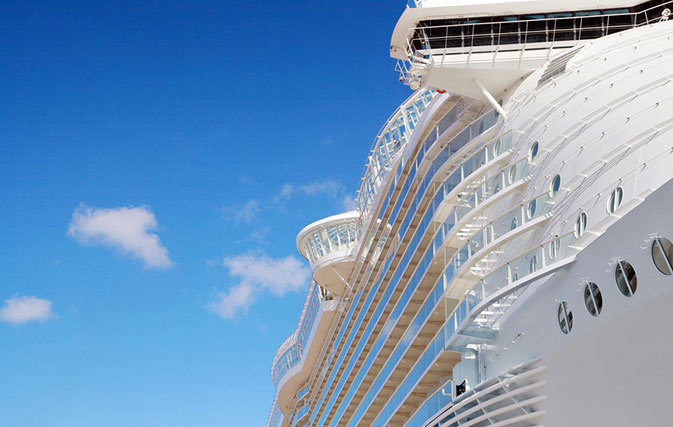TORONTO — Cruise clients can expect ramped up boarding procedures and higher level screening, according to new ship embarkation policies hammered out by CLIA and its member cruise lines over the weekend following a roundtable meeting between cruise line executives and U.S. Vice President Mike Pence.
The Centers for Disease Control and Prevention in the U.S. is recommending that all U.S. travellers, especially those with underlying health issues, “defer all cruise ship travel worldwide”, and the U.S. Department of State has issued a new recommendation against cruise ship travel.
And following the lead in the U.S., just today the Public Health Agency of Canada is now also advising against cruise travel for Canadian travellers.
Already in the U.S. there is pushback against the new travel advisories against cruising, and accusations of mixed messages.
The Destination Wedding & Honeymoon Specialists Association (DWHSA) has come out swinging. “We’re gravely concerned about the unintended consequences of the latest U.S. government travel advisories warning Americans not to cruise,” says DWHSA President Lisa Sheldon.
“The World Health Organization advises clearly against travel bans and restrictions in fighting the COVID-19 outbreak, saying they’re ‘usually not effective in preventing the importation of cases but may have a significant economic and social impact.’
“The new advisories against cruising will affect thousands of U.S. couples who’ve planned destination weddings and honeymoons on ships over the next year. They contradict directly the statements from Vice President Mike Pence given on March 7 as he met with cruise industry leaders to increase port screenings and to take other preventative measures to protect passengers. And, they will lead to financial hardship for tens of thousands of workers with cruise lines and related businesses if cruising grinds to a halt.
“We urge U.S. officials to reconsider these advisories and to focus instead on working more closely with cruise lines to implement tighter screenings and other measures to fight the coronavirus outbreak.”
Ahead of the weekend meeting CLIA issued a statement late on Friday firing back at the possibility that the Trump administration could mete out heavy-handed restrictions on cruising, causing a ripple effect on the industry worldwide.
As it stands now, the new policy for CLIA members effective immediately includes …
. Deny boarding to all persons who have travelled from, visited or transited via airports in South Korea, Iran, China, including Hong Kong and Macau, and any municipality in Italy subject to lockdown (quarantine) measures by the Italian Government, as designated by the Ministry of Foreign Affairs, within 14 days prior to embarkation.
. Conduct illness screening for all persons who have travelled from, visited or transited via airports in any destinations listed on the U.S. CDC “Coronavirus Disease 2019 Information for Travel” page within 14 days before embarkation. Illness screening includes symptom history checks for fever, cough and difficulty breathing in the 14 days before embarkation and taking of temperature.
. Conduct temperature screening, as soon as they are capable, at initial embarkation for all persons boarding. Any individual with a temperature detected at or above 100.4° F / 38° C is to receive secondary screening to include a medical assessment.
. Deny boarding to all persons who, within 14 days prior to embarkation, have had contact with, or helped care for, anyone suspected or diagnosed as having COVID-19, or who are currently subject to health monitoring for possible exposure to COVID-19.
. Conduct pre-boarding screening necessary to effectuate these prevention measures. Enhanced screening and initial medical support are to be provided, as needed, to any persons exhibiting symptoms of suspected COVID-19.
“We have committed to do even more to protect our guests, our crew and the communities where we sail. This includes more stringent boarding procedures, adding additional onboard medical resources and temperature screenings at embarkation,” says CLIA.
“We will also develop industry funded protocols to care for guests on land in the event of an incident to eliminate future incidents of onboard quarantine.”
While the new policies stop short of severe restrictions, the perceived hassle factor – and the potential for being denied boarding because of a fever, no matter what the cause – is still problematic for the cruise industry.
After extensive consumer media coverage of the Diamond Princess quarantine off the coast of Japan in early February, now Grand Princess is in the news. The 237 Canadian passengers who were onboard Grand Princess, which was anchored off the coast of California awaiting coronavirus testing, are being repatriated back to Canada to CFB Trenton for a 14-day quarantine. Meanwhile Regal Princess was cleared to return to Port Everglades last night.
With cruise lines under the microscope, and with so many cruise lines based in and sailing out of Florida, not surprisingly this weekend’s roundtable meeting with Pence also prompted questions about Florida’s theme parks and the coronavirus.
Though several conventions in Orlando have been cancelled because of concerns, individual leisure travel hasn’t been affected, local officials said.
Disney officials said in a statement that extra hand sanitizers were being placed throughout its four parks and more than two dozen hotels.
Tom Schroder, a spokesman for Universal Orlando, said it is reinforcing “best-practice health and hygiene procedures” in response to the coronavirus outbreak and adding more hand sanitizer units to its parks.
“We will continue to closely monitor the situation and be ready to act as needed,” he said.
With file from The Associated Press

